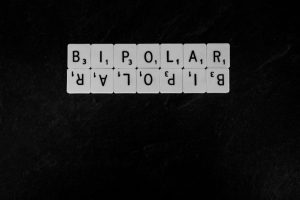 A common question that comes up in consultation is, “What is Bipolar Disorder?”
A common question that comes up in consultation is, “What is Bipolar Disorder?”
There is a lot of confusion regarding this diagnosis because of the colloquial use of the term “bipolar.” This term is thrown around to describe instances of intense emotional outbursts, frequent mood swings, unpredictable behavior, or even an excuse for poor behavior: “sorry I went off on you, so bipolar of me.” Very different from the colloquial meaning, the medical meaning is a more defined psychiatric illness that can be controlled with appropriate treatment.
Most people are familiar with the diagnosis of depression and what that looks like. Bipolar Disorder consists of episodes of depression as well as episodes of mania or hypomania. These manic or hypomanic episodes with which most people are less familiar. Mania is a mood state that is defined as a period of abnormally and persistently elevated mood or irritability that is very different from someone’s normal personality lasting one (1) week or more. It is combined with at least 3 of the following symptoms: inflated self esteem, decreased need for sleep, excessive talking, racing thoughts, being more easily distracted, increased goal directed activity (work, cleaning, etc), and impulsive behavior out of the norm (spending sprees, sexual behavior, etc). Hypomania which are episodes which are lower manic symptoms (hypo) and only need to last four (4) consecutive days and are less severe in their presentation than mania. To be diagnosed with bipolar disorder, someone needs to meet criteria for having at least one manic or hypomanic episode and a depressive episode. Those people with depressive episodes and manic episodes are diagnosed with Bipolar I Disorder, and those with depressive episodes and hypomanic episodes are diagnosed with Bipolar II Disorder.
Both Major Depressive Disorder (MDD) and Bipolar Disorder (BD) fall under the category of mood disorders. Because the treatment of these brain illnesses is different, a clear and accurate diagnosis is important to make sure the right treatment is given. MDD is treated with antidepressants, psychotherapy, and specific neuromodulation treatments. BD is treated with mood stabilizers, other pharmacological agents, psychotherapy, and some neuromodulatory treatments (VNS and ECT), depending on which mood state the person is suffering (depression, mania, or hypomania). Treating someone with bipolar disorder with antidepressants, even when they have depressive symptoms, could make them feel worse. Getting an accurate diagnosis, though, can be difficult as some people have difficulty seeing the symptoms of hypomania and mania. Patients can be unaware of hypomanic episodes and therefore don’t report the symptoms to their physician making Bipolar II Disorder one of the hardest brain conditions to diagnose. In order to obtain an accurate diagnosis, find a clinician you trust and see them consistently for a period of time because getting to know someone in their different mood states can help clarify the diagnosis.
At the NeuroScience & TMS Treatment Center, we have several treatment options we can use, beyond common medications and therapy, to aggressively treat you for brain diseases. Learn more about our treatments and services on our Comprehensive Behavioral Health Page.
Blog Post Authors
 Michelle Cochran, MD, DFAPA
Michelle Cochran, MD, DFAPA
Founder & Chief Medical Officer • Medical Director, Nashville Locations
Dr. Cochran has been living and working in the Nashville area for over 25 years. She supervises the skilled Nurse Practitioners who work in our clinics. She has been offering TMS services since 2011 and lectures and consults nationally and internationally about TMS. She is Board Certified and is a Distinguished Fellow of the American Psychiatric Association. Learn more about Dr. Cochran.
 Jonathan Becker, DO
Jonathan Becker, DO
Medical Director, Brentwood Locations
Dr. Becker is a native of Tennessee, born in Memphis. He completed his undergraduate and master’s degrees in Developmental Psychology at Tulane University in New Orleans before attending Des Moines University for Medical School. He completed his psychiatry residency program at Vanderbilt University and served as a faculty member there for 7 years before transitioning to our office. While at Vanderbilt, Dr. Becker served as the medical director of the neuromodulation service from 2017-2020. Dr. Becker has also published many psychiatric articles. Learn more about Dr. Becker.
